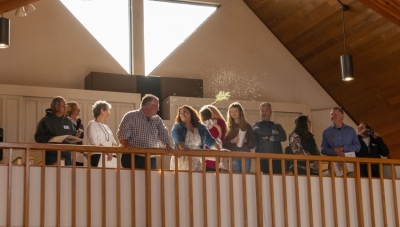Leadership
What is a Diocese

A diocese is the territorial jurisdiction of a diocesan bishop. The term also refers to the congregations and church members of the diocese. Before the church adopted the word it had a long secular usage. It was originally used in the Roman Empire for an administrative subdivision. A diocese was a division of a prefecture of the Roman Empire. In the reorganization of Diocletian and Constantine, the Roman Empire was divided into twelve dioceses. As the church expanded out from the cities, it adopted the use of the word “diocese,” and ecclesiastical dioceses tended to correspond to civil units.
Read More »Board of Trustees
The Board is the legal entity of the diocese, incorporated under California law as “The Episcopal Church in the Diocese of El Camino Real.” The Diocesan Corporation administers the property and assets of the diocese, and acts on behalf of and under the authority of Diocesan Convention between meetings to develop and implement the policies, programs, and budget approved and adopted by Convention. The corporation consists of multiple elected and non-voting board members.
Read More »Standing Committee
The Standing Committee is one of three diocesan bodies whose existence is mandated by the Constitution of The Episcopal Church (others being the Finance Committee and the Commission on Ministry). The Standing Committee approves encumbrances on properties, recommends people for ordination and as chief Council of Advice to the bishop.
Read More »Diocesan Convention
The upcoming 43rd Diocesan Convention is scheduled for Saturday, November 4, and will utilize the same digital platform as the 2022 event. Additionally, there will be a Spring Renewal gathering in 2024, which will include a banquet and opportunities for face-to-face fellowship.
Read More »Constitutions & Canons
The Constitution and Canons are the written rules governing diocesan policy, structure and procedure. They must be in conformance with the Constitution and Canons of the national church. What’s the difference? A constitution is the fundamental legal document of an institution, establishing its existence, structure and rules for governance. A canon is a specific ecclesiastical rule of law enacted by a Convention in sync with the constitution.
Read More »General Convention of the Episcopal Church

The General Convention is the governing body of The Episcopal Church. The Convention is a bicameral legislature that includes the House of Deputies, which has more than 800 members, and the House of Bishops, which is comprised of nearly 300 active and retired bishops. The Convention meets every three years and has the authority to amend the Constitution and Canons of The Episcopal Church; adopt the budget for the church for the next three years; authorize liturgical texts and amend the Book of Common Prayer; adopt communions and covenants with other churches; set qualifications for orders of ministry and office-holders; elect officers of the General Convention, the Executive Council, and members of boards; and delegate responsibilities to the interim bodies of The Episcopal Church.
Read More »